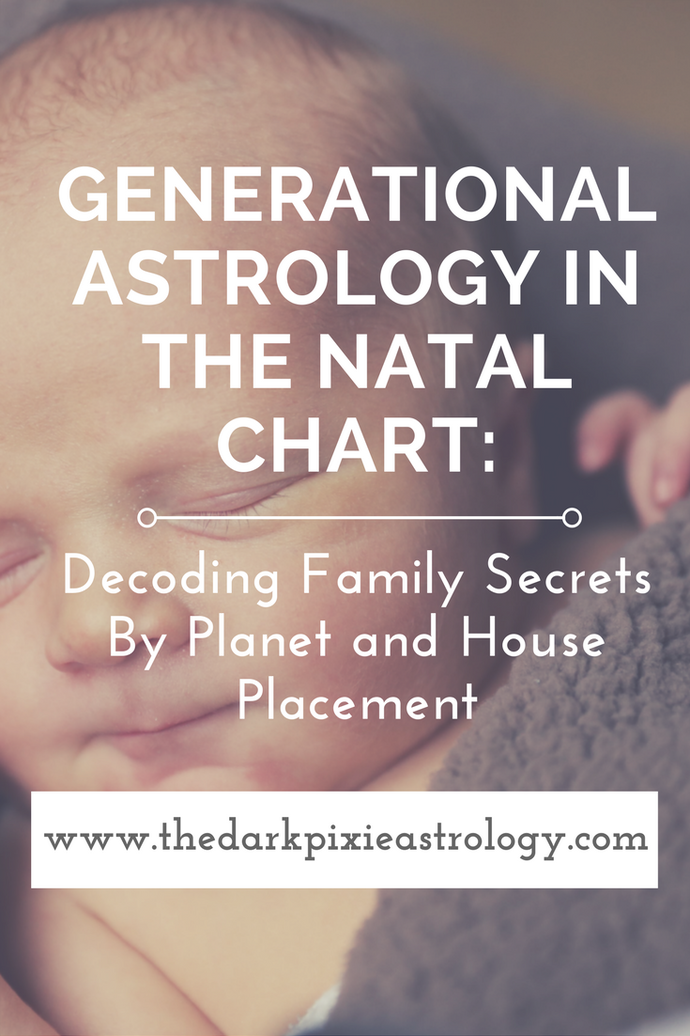Generational Astrology In the Natal Chart: Decoding Family Secrets By Planet and House Placement4/5/2017
Followers of western astrology are aware of the outer planets (Jupiter, Saturn, Uranus, Neptune, and Pluto) and the generational influences they contribute to the natal chart. Plutonic energy, for example, rules transformation and destruction but it also unites a specific segment of the population. People born during the same period of time share universal experiences through music, politics, current events, social change, and lifestyle trends. Therefore, each Pluto generation creates upheaval to patterns established by the previous generation and eventually their structure will be overturned by future Pluto generations. Pluto’s influence in the natal chart is a generalized example of generational astrology. Many astrologers are knowledgeable about the impact of outer planets on generations of people but there is also an individual aspect to generational astrology that weaves through family interactions. The natal chart can be analyzed to reveal family secrets. Astrologers often use the natal chart as a way to decode family dynamics and skeletons in the closet. Paying close attention to the placement of inner and outer planets as well as the houses representing family members and themes will provide clues to the chart holder’s family history. Aspects also need to be considered as sometimes challenging ones plague generations of families; i.e. Sun square Saturn, which could pinpoint a generational pattern of father/son self-esteem issues or inherited tendencies toward depression throughout a family lineage. Inner planets in a natal chart will reveal family values throughout the generations as well as parents’ and grandparents’ identity roles relating to the chart holder. The Sun in the natal chart represents the parent’s ego and self-truth. The natal Moon placement indicates a parent’s prenatal attachment to the baby, their parenting styles and attitudes, and can even explain how the grandparents of the baby processed emotions during the parent’s childhood. Mercury placement in the natal chart represents extended family relationships and the family’s oral history. Venus indicates the family’s social background through different generations. Mars connotes family boundaries, anger, and sexual attitudes. Outer planets are indicative of the family’s generational legacies regarding psychological health and behavioral choices. Jupiter will show a family’s propensity toward addiction as well as their religious practices. The grandparents of the chart holder are exhibited by the chart holder’s Saturn placement. Uranus indicates the way the parents conducted their personal lives prior to conceiving the chart holder. Neptune in the natal chart evinces both physical health and behavioral health issues (particularly passed through the family). Pluto in the natal chart manifests as family survival. Houses in the natal chart reveal generational identity in addition to what life was like for the parents during the chart holder’s gestational period in the mother’s womb. The first house expresses or represses identity. The second house rules class issues and the family’s financial situation. The third house rules family communication and foreign language. The fourth house is an important prenatal house as it rules parents and extended family as well as the security or lack of security the family provides for the chart holder. The fifth house rules fertility and challenges to fertility. The sixth house rules the family’s attitude towards work and health. The seventh house rules partnership and arranged marriages. The eighth house indicates family financial legacies from before the chart holder’s birth, family sexual boundaries, the health of family members, and the need to immigrate to another country. The ninth house will reveal generational access to education, immigration, and family expansion. The tenth house rules the family’s name and reputation. The eleventh house rules the family’s friends and social network. The twelfth house rules family secrets or any issues the family represses. Plutonic energy can unite an entire generation of human beings. It can also influence a family’s interpersonal dynamics through several generations. The key to generational astrology in the natal chart is to use the energy found in the planets and houses to better understand what type of circumstances family generations have had to contend with, their coping mechanisms for survival, and how these legacies been passed down to the chart holder for better or worse. Comments are closed.
|
|




 RSS Feed
RSS Feed
